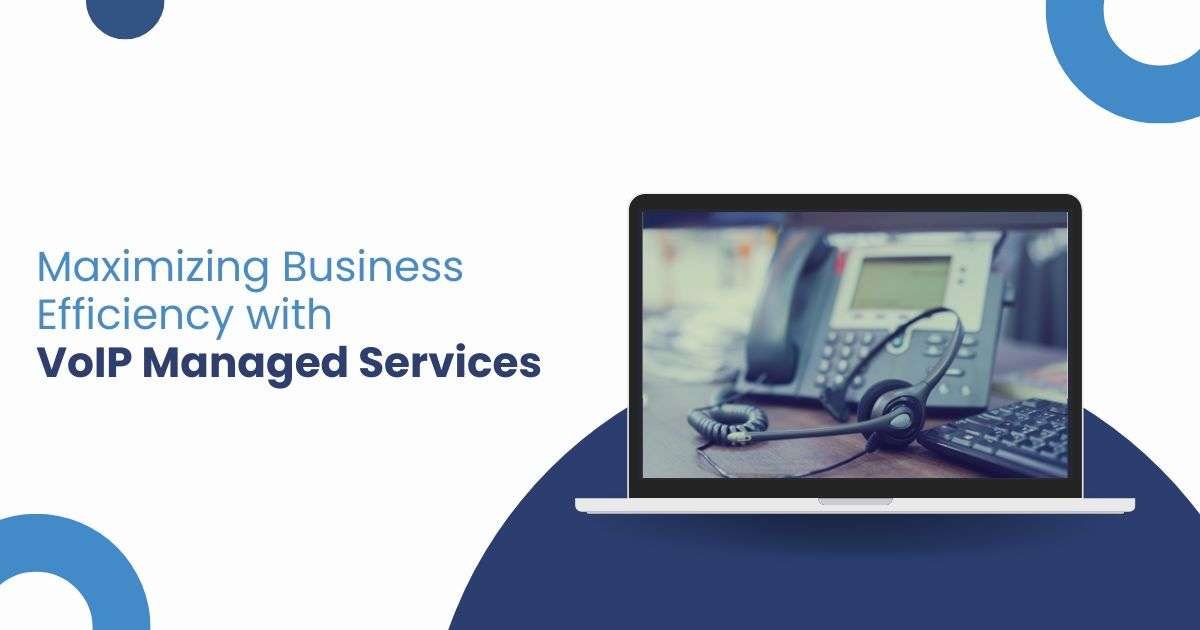In today’s fast-paced business environment, communication plays a crucial role in driving productivity and efficiency. As VoIP Managed Services continues to evolve, traditional phone systems are being replaced by more advanced and flexible solutions, with VoIP (Voice over Internet Protocol) leading the way. In this article, we’ll explore the concept of best VoIP services and how they can revolutionize communication within your organization.
Understanding VoIP Technology
VoIP technology allows users to make phone calls using the internet rather than traditional phone lines. This innovative approach not only reduces costs but also offers a wide range of features and functionalities that are not possible with traditional phone systems. With Voip can enjoy crystal-clear voice quality, seamless scalability, and the ability to integrate with other communication tools such as video conferencing and instant messaging.

Benefits of VoIP Managed Services
Implementing VoIP offers numerous benefits for businesses of all sizes. Firstly, it provides access to advanced features such as auto-attendants, call forwarding, and voicemail-to-email transcription, enhancing communication efficiency and professionalism. Additionally, VoIP-managed services typically come with round-the-clock technical support, ensuring minimal downtime and maximum uptime for your communication infrastructure.
Key Components of VoIP Managed Services
VoIP managed services encompass a range of components that work together to deliver a seamless communication experience. These include:
1. Hosted PBX: A cloud-based phone system that eliminates the need for on-premises hardware, reducing upfront costs and maintenance requirements.
2. VoIP Phones: Specialized phones designed to work with VoIP technology, offering features such as HD voice quality and intuitive user interfaces.
3. Internet Connection: A reliable internet connection is essential for VoIP communication, ensuring consistent call quality and connectivity.
4. Quality of Service (QoS) Settings: Configuration settings that prioritize VoIP traffic on your network, preventing congestion and ensuring a smooth communication experience.
Choosing the Right VoIP Provider
Selecting the right VoIP service provider is crucial for the success of your communication infrastructure. When evaluating potential providers, consider factors such as reliability, scalability, pricing, and customer support. Look for providers that offer customizable solutions tailored to your business needs, as well as robust security measures to protect sensitive communication data.
Implementation Process of VoIP Managed Services
The implementation process of VoIP-managed services typically involves the following steps:
1. Assessment: A thorough assessment of your current communication infrastructure to identify existing pain points and requirements.
2. Planning: Develop a comprehensive implementation plan that outlines timelines, resource allocation, and potential challenges.
3. Deployment: Rolling out thebusiness VoIP solutions according to the implementation plan, ensuring minimal disruption to ongoing business operations.
4. Training: Providing training sessions for employees to familiarize them with the new VoIP system and its features.
5. Testing and Optimization: Conducting thorough testing to ensure that the VoIP system meets performance expectations, followed by ongoing optimization to address any issues that may arise.
Security Considerations in VoIP Managed Services
Security is a top priority when it comes to VoIP managed services, as communication data is transmitted over the internet. To ensure the confidentiality, integrity, and availability of your communication infrastructure, consider implementing the following security measures:
1. Encryption: Encrypting VoIP traffic to prevent eavesdropping and unauthorized access to sensitive information.
2. Firewalls: Configuring firewalls to filter and monitor incoming and outgoing VoIP traffic, blocking malicious attacks and unauthorized access attempts.
3. Access Control: Implementing access control measures to restrict access to VoIP systems and sensitive communication data to authorized users only.
4. Regular Updates and Patches: Keeping VoIP systems up to date with the latest security patches and updates to address known vulnerabilities and mitigate potential risks.
Monitoring and Maintenance in VoIP Managed Services
Regular monitoring and maintenance are essential to ensure the optimal performance and reliability of VoIP managed services houston. This includes:
1. Performance Monitoring: Monitoring call quality, network performance, and system uptime to identify and address any issues promptly.
2. Software Updates: Applying software updates and patches to VoIP systems to address security vulnerabilities and improve functionality.
3. Proactive Maintenance: Conducting regular inspections and proactive maintenance activities to prevent potential problems and minimize downtime.
4. 10/6 Technical Support: Having access to round-the-clock technical support to address any issues or concerns that may arise, ensuring minimal disruption to business operations.
Scalability and Flexibility of VoIP Managed Services
One of the key advantages of VoIP managed services is their scalability and flexibility. Whether your business is expanding or downsizing, best voip services can easily scale to accommodate changing needs. Additionally, VoIP solutions offer a wide range of features and customization options, allowing you to tailor the communication infrastructure to suit your specific requirements.
Cost Analysis of VoIP Managed Services
While the initial investment in VoIP-managed services may seem daunting, it’s essential to consider the long-term cost savings and benefits. By switching to voip business phone servicevcan reduce their monthly phone bills, eliminate the need for expensive hardware upgrades, and streamline communication processes, resulting in increased productivity and efficiency.
Integration with Existing IT Infrastructure
Integrating VoIP managed services with existing IT infrastructure is essential to ensure seamless communication and collaboration across the organization. Whether you’re using cloud-based productivity tools or on-premises applications, VoIP systems can be easily integrated to enhance workflow efficiency and streamline business processes.
Regulatory Compliance in VoIP Managed Services
Compliance with regulatory requirements is critical for voip business phone service operating in highly regulated industries. When implementing VoIP managed services, ensure that the solution complies with relevant regulations such as HIPAA (Health Insurance Portability and Accountability Act) and GDPR (General Data Protection Regulation) to avoid potential fines and legal repercussions.
Successful Implementations of VoIP Managed Services
To illustrate the real-world benefits of VoIP managed services, let’s take a look at some case studies of businesses that have successfully implemented business voip solutions:
1. All Stars dental kids: All Stars Dental Kids, a multinational corporation with offices across the globe, was facing challenges with its outdated phone system, which was costly to maintain and lacked essential features. By switching to best voip services, All Stars Dental Kids was able to streamline communication processes, reduce costs, and improve collaboration among its employees.
2. Magnolia dental care: Magnolia dental care, a small startup with limited resources, was looking for a cost-effective communication solution that could scale with its growing business. By opting for cloud-based VoIP services, Magnolia dental care was able to avoid hefty upfront costs associated with traditional phone systems while enjoying the flexibility and scalability of VoIP technology.
Future Trends in VoIP Managed Services
Looking ahead, several trends are shaping the future of VoIP manage services:
1. Artificial Intelligence (AI) Integration: Integration of AI-powered features such as virtual assistants and speech recognition technology to enhance user experience and automate routine tasks.
2. 5G Adoption: The widespread adoption of 5G technology is expected to further improve call quality, reliability, and speed, opening up new possibilities for VoIP communication.
3. Unified Communications: Integration of VoIP with other communication tools such as video conferencing, instant messaging, and collaboration platforms to create a unified communication experience.
4. Enhanced Security Measures: Continued focus on implementing robust security measures to protect against
evolving cyber threats and ensuring the confidentiality and integrity of communication data.
Maximizing Value with VoIP Manage Services
VoIP managed services offer a cost-effective, flexible, and feature-rich solution for businesses looking to streamline communication processes and enhance productivity. By leveraging VoIP technology and partnering with a reliable service provider, businesses can unlock new possibilities for collaboration, efficiency, and growth in today’s digital age.














